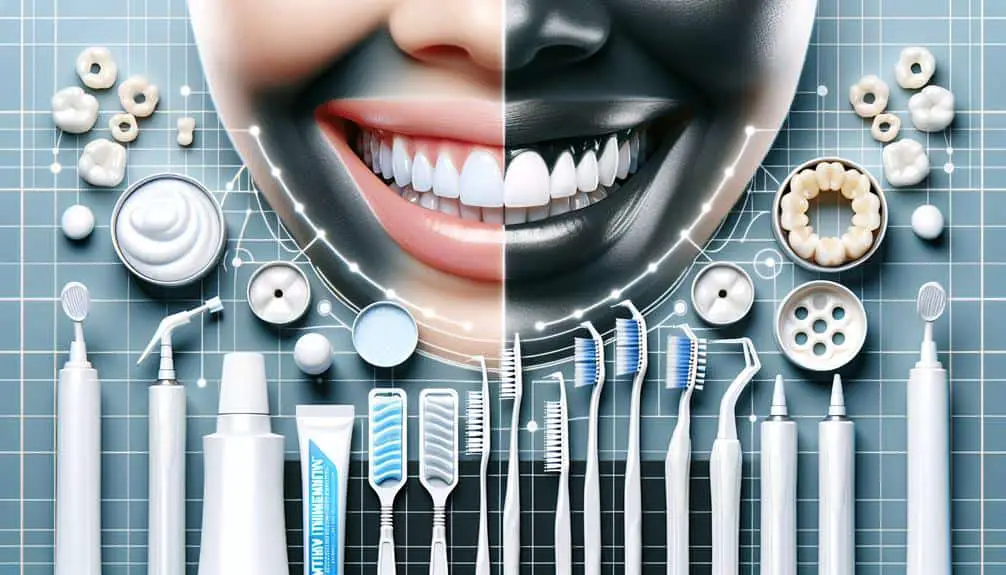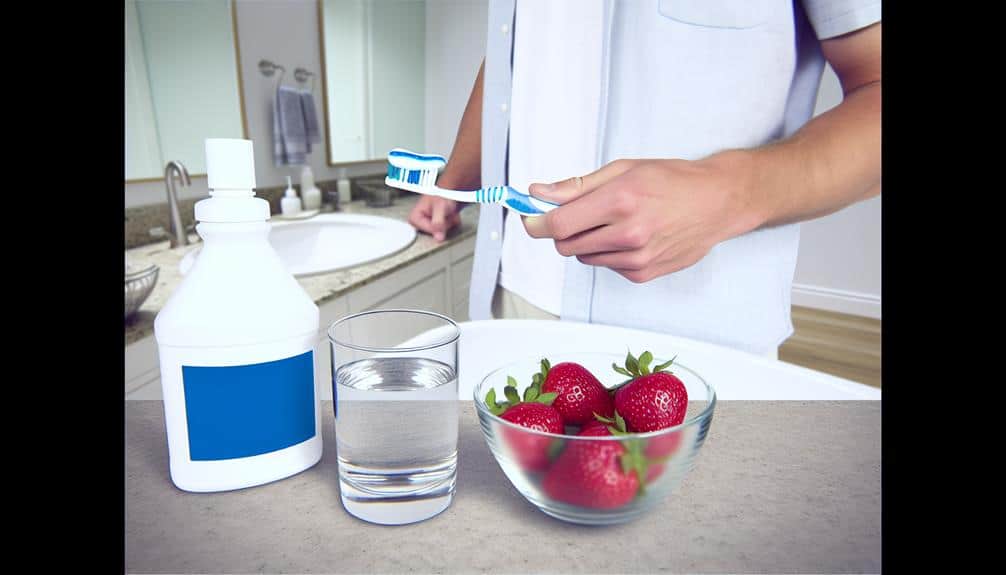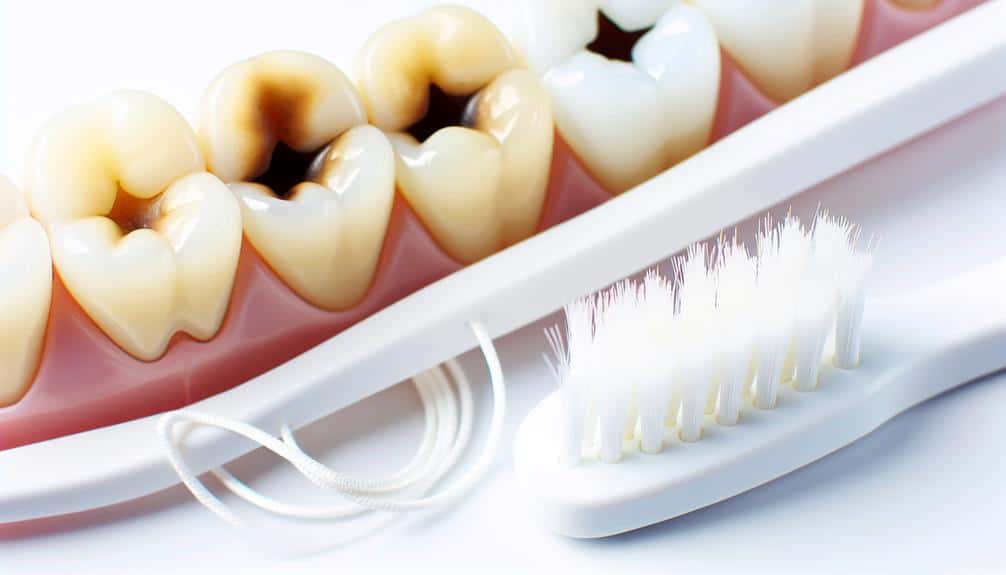To address persistent teeth discoloration effectively, consider professional in-office whitening procedures with high-concentration bleaching gels for immediate results tailored to your staining severity. Custom trays in at-home whitening kits guarantee even gel distribution and cost-effective maintenance, while whitening toothpaste and mouthwash used consistently can combat stains. Over-the-counter strips and gels offer convenient whitening options with careful application. For a natural approach, try gentle remedies like baking soda, oil pulling, vinegar, or diet adjustments. A brighter smile awaits with these solutions.
Key Points
- Professional in-office whitening offers immediate and noticeable results with high-concentration bleaching gels.
- At-home kits with custom trays ensure even gel distribution for effective stain removal.
- Consistent use of whitening toothpaste and mouthwash fights discoloration effectively.
- Over-the-counter whitening strips and gels provide convenience with careful and consistent usage.
- Natural remedies like baking soda and oil pulling can help reduce teeth discoloration gradually.
Professional In-Office Whitening Procedures
For a quick and effective way to address teeth discoloration, consider professional in-office whitening procedures offered by experienced dentists. Dental bleaching, commonly known as teeth bleaching, is a popular method for enhancing the brightness of your smile. This procedure involves the application of a bleaching agent directly to the teeth, which helps remove stains and discoloration.
Professional in-office whitening procedures are highly effective due to the use of high-concentration bleaching gels that can only be applied by trained professionals. Dentists carefully safeguard the gums and soft tissues before applying the bleaching agent to guarantee safety and minimize any potential side effects. The results of in-office whitening are often immediate and more noticeable compared to at-home treatments.
Furthermore, professional whitening procedures are tailored to your specific needs, allowing for a personalized approach to address your teeth discoloration. Dentists can adjust the concentration of the bleaching agent based on the severity of staining, ensuring excellent results while minimizing sensitivity. Consider consulting with a dental professional to determine if professional in-office whitening is the right choice for you.
At-Home Whitening Kits With Custom Trays
Consider exploring at-home whitening kits with custom trays as a convenient option for maintaining your bright smile beyond professional in-office whitening procedures. Custom trays offer a personalized fit, ensuring that the whitening gel is evenly distributed across your teeth, leading to more consistent results. The benefits of custom trays include better coverage of the teeth surfaces, reduced contact of the gel with the gums, and a comfortable fit that allows for longer wear times without discomfort.
The effectiveness of the whitening gel is maximized when used with custom trays as they help hold the gel securely against the teeth, allowing it to work on stubborn stains effectively. Custom trays also minimize gel leakage, preventing potential irritation to the gums and surrounding tissues. By following the instructions provided with the kit and using the custom trays consistently, you can achieve noticeable improvements in the color of your teeth within a few weeks. Custom trays provide a cost-effective and practical solution for maintaining a bright and radiant smile in the comfort of your own home.
Whitening Toothpaste and Mouthwash Regimen
Enhance your daily oral care routine with a whitening toothpaste and mouthwash regimen to combat teeth discoloration effectively. When it comes to addressing persistent teeth discoloration, incorporating these products into your regimen can make a noticeable difference. Here's how they can help:
- Whitening Toothpaste: Look for toothpaste containing ingredients like hydrogen peroxide or baking soda, known for their stain-fighting properties. These toothpaste formulations can gently remove surface stains caused by food and drinks, enhancing the whiteness of your teeth over time.
- Whitening Mouthwash: Using a whitening mouthwash after brushing can provide an extra layer of protection against discoloration. Look for mouthwashes with whitening agents like hydrogen peroxide or fluoride to help maintain the brightness of your smile.
- Regular Use: Consistency is key when it comes to seeing results. Incorporate these products into your daily routine and consider factors like diet impact and lifestyle habits that may contribute to teeth staining to maximize the effectiveness of your whitening regimen.
Over-the-Counter Whitening Strips and Gels
To continue improving the whiteness of your teeth, explore the effectiveness of over-the-counter whitening strips and gels as convenient options for addressing teeth discoloration. DIY whitening remedies have gained popularity due to their ease of use and affordability. Over-the-counter whitening strips typically contain a bleaching agent like hydrogen peroxide, which helps remove stains from the surface of your teeth. These strips are applied directly to the teeth and left on for a specified amount of time.
Similarly, whitening gels work by applying a thin layer to the teeth using a small brush or tray.
Teeth bleaching trends have shown a shift towards at-home solutions, making whitening strips and gels a go-to choice for many individuals seeking a brighter smile. While these products can provide noticeable results over time, following the instructions carefully is crucial to avoid potential side effects like tooth sensitivity or gum irritation. Remember, consistency is key when using over-the-counter whitening strips and gels for effective teeth whitening.
Natural Remedies for Teeth Discoloration
When seeking natural remedies for teeth discoloration, explore the efficacy of ingredients like baking soda for gentle whitening effects. Baking soda has mild abrasive properties that can help remove surface stains on teeth without being too harsh on the enamel.
In addition to baking soda, consider the following home remedies and dietary changes to combat teeth discoloration:
- Oil pulling: Swishing coconut oil or sesame oil in your mouth for about 15-20 minutes daily may help reduce bacteria and plaque that contribute to yellowing of teeth.
- Apple cider vinegar: Dilute apple cider vinegar with water and use it as a mouthwash to help whiten teeth. However, be cautious as its acidic nature can erode enamel if used excessively.
- Eating crunchy fruits and vegetables: Foods like apples, carrots, and celery can help scrub teeth naturally while promoting saliva production, which aids in keeping teeth clean.
These natural remedies and dietary adjustments can be incorporated into your oral care routine to help maintain a brighter smile over time.
Frequently Asked Questions
Are There Any Long-Term Side Effects Associated With Professional In-Office Whitening Procedures?
When opting for professional in-office whitening, be aware of potential risks. Long term effects may include tooth sensitivity and gum irritation. Custom trays can help mitigate these issues. Consult your dentist for personalized advice.
Can At-Home Whitening Kits With Custom Trays Cause Tooth Sensitivity or Gum Irritation?
Using at-home whitening kits with custom trays might cause slight tooth sensitivity or gum irritation in rare cases. Although potential risks exist, these can often be managed by following instructions carefully. Alternatives to contemplate include professional dental consultations.
How Often Should Whitening Toothpaste and Mouthwash Be Used to See Noticeable Results?
For best results, use whitening toothpaste twice daily for noticeable effects. Incorporate whitening mouthwash into your routine for added effectiveness. Consistent usage is key to achieving a brighter smile with these products.
Are There Any Risks of Enamel Damage From Using Over-The-Counter Whitening Strips and Gels Frequently?
As you ponder the risks of frequent whitening strip and gel use, be wary of potential enamel damage. Overuse can weaken enamel, leading to sensitivity and brittleness. Always follow product instructions and consult your dentist.
Do Natural Remedies for Teeth Discoloration Have Any Potential Interactions With Medications or Existing Dental Conditions?
Natural remedies for teeth discoloration can potentially interact with medications or existing dental conditions. It's important to consult your dentist or healthcare provider before trying these remedies to make sure they are safe and effective for your specific situation.



